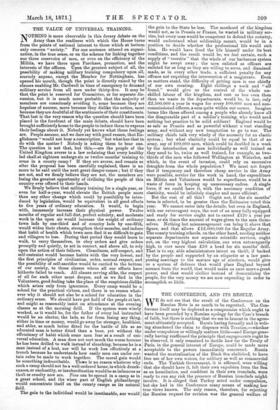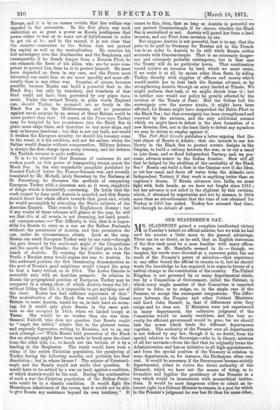THE CONFERENCE, AND ITS RESULT.
WE do not see that the result of the Conference on the Russian Note is so much to be regretted. The Con- ference itself may be deplored as a compromise which ought to have been preceded by a Russian apology for the Czar's breach of faith, but there is nothing that we see to lament in the agree- ment ultimately accepted. Russia having formally and in writ- ing abandoned the claim to dispense with Treaties,—whether under compulsion or willingly matters little—and Europe gene- rally having reaffirmed the principle that engagements ought to be observed, it only remained to decide how far the Treaty of Paris, in the general interest of Europe, could be made more acceptable to the powers immediately concerned. Russia wanted the neutralization of the Black Sea abolished, to have free use of her own waters, for military as well as commercial ends. The Turkish Government, it is affirmed, were willing that she should have it, felt their own expulsion from the Sea as an humiliation, and confident in their own ironclads, were ready to run any risk the presence of Russian ironclads might
involve. It is alleged that Turkey acted under compulsion, but she had in the Conference many means of making her true views known. The only reason, therefore, for rejecting the Russian request for revision was the general welfare of
Europe, and it is by no means certain that her welfare was opposed to the concession. In the first place, any such restriction on so great a power as Russia predisposes that power either to war or to some act of faithlessness in order to get rid of it ; and in the second, it is not clear that the counter - concession to the Sultan does not protect his capital as well as the neutralization. He recovers his full sovereignty over the Dardanelles and the Bosphorus, and consequently, if he dreads danger from a Russian Fleet, he can summon the fleets of his allies, who are far more com- petent to protect him than he is to protect himself. He must have depended on them in any case, and the Power most interested can assist him at sea more speedily and more effi- ciently than in any other way. Surprise, of course, becomes possible, because Russia can build a powerful fleet in the Black Sea ; but only by treachery, and treachery of that kind could not have been prevented by any paper docu- ment. Under the revised Treaty, in plain words England -can, should Turkey be menaced, act as freely in the Black Sea as in the Mediterranean, and no guarantee against naval surprise by an enemy of Great Britain could be more perfect than that. Of course, as the Times says, Turkey may be tempted by her re-entrance into the Black Sea to place more ships there, and therefore to buy more ships, and may so become insolvent ; but that is not our fault, nor would it weaken the European security, for should his treasury come to the worst, it is his creditors, and not his sailors, whom the Sultan would dismiss without compensation. Military defence is always the first charge upon every treasury, and for defence the Turkish revenue is quite sufficient.
It is to be observed that Russians of eminence do not reckon much on this power of transporting troops across the Black Sea. In the very remarkable pamphlet published by General Facleeff before the Franco-German war, and recently translated by Mr. Michell, lately Secretary to the Embassy at St. Petersburg, he discusses the methods of conquering European Turkey with a clearness and, as it were, simplicity of design which is irresistibly convincing. He holds that the work cannot be done until Austria is muzzled, and that Russia should direct her whole efforts towards that great end, which he would accomplish by attracting the Slavic subjects of the Austrian Empire. That sounds to Englishmen dreamy ; but if any reader of these columns will glance at the map, he will see that this, at all events, is not dreaming, but hard, practi- cal common-sense :—" The difficulty is this, that it is impos- sible for Russia to carry on a war on the Balkan Peninsula without the permission of Austria, and that permission she can, under no circumstances, obtain. Look at the map. Russia can reach European Turkey only by one road—through the gate formed by the south-east angle of the Carpathians and the mouth of the Danube : the key of that gate is in the hands of Austria. By crossing the Danube, or even the Pruth, a Russian army would expose her rear to Austria. In this awkward position the first threatening demonstration on the part of Russia's good neighbour would compel the army to beat a hasty retreat, as in 1854. The Lower Danube is accessible only with an Austrian passport. In relation to Russia the geographical position of European Turkey may be compared to a strong chest, of which Austria forms the lid ; without lifting that lid, it is impossible to get anything out of the chest. Russia has had sufficient experience of that." The neutralization of the Black Sea would not help Great Britain to assist Austria, would for us, in fact, have no mean- ing, for it would only place Russia in the same posi- tion as she occupied in 1854, when we landed troops at Varna. She would be no weaker than she was then. General Fadeeff, who does not question that Russia ought to "expel the infidel," admits this in the plainest terms, and expressly deprecates, writing to Russians, not to us, any such attempt :—" While Russia held possession of the Black Sea an attempt might have been made to break open the chest from the other side, i.e., to knock out the bottom of it by a landing in the Bosphorus. The result would have been a rising of the entire Christian population, the paralyzing of Turkey during the following months, and probably her final dissolution ; but in whose favour? The seizure of Constanti- nople and the Straits would not settle that question. It would have to be settled by a war on land, against a coalition, of which Austria would be the soul. During the continuation of such a war the Christian population of the Balkan Penin- sula would be in a chaotic condition. It would fight the Mussubnan inhabitants of the towns, but it would not be able to give Russia any assistance beyond its own territory." It
comes to this, then, that as long as Austria is powerful we can protect Constantinople if we choose, whether the Black Sea is neutralized or not. Austria will guard her from a land invasion, and our Fleet from invasion by sea.
But suppose Austria is not powerful, that is to say, that the _price to be paid by Germany for Russian aid in the French war is an order to Austria to lie still while Russia settles accounts with Constantinople. That is an extremely danger- ous and extremely probable contingency, but in that case the Treaty will do no particular harm. That combination would involve an invasion by land, which we must resist, if we resist it at all, by means other than fleets, by aiding Turkey directly with supplies of officers and money which would enable her to beat back the Russian advance, or by strengthening Austria through an army landed at Trieste. We might perform that task, or we might shrink from it ; but in neither case would our policy be greatly affected by the revision of the Treaty of Paris. Had the Sultan lost his sovereignty over the narrow straits, it might have been affected, for Russia might have despatched the Baltic Fleet to the Black Sea ; but that sovereignty has been strengthened and renewed by the revision, and the only additional menace which we might have to defeat is the slow formation of a new Russian fleet, not in the least likely to defeat any squadron we may be driven to employ against it.
The Pall Mall Gazette publishes a letter arguing that the real object of Russia is Asiatic; that she intends to use her liberty in the Black Sea to protect certain designs in the Caspian, to build a railway between the seas, or to cut a canal to join them, and so flood Independent Tartary, and, we pre- sume, advance nearer to the Indian frontier. How will all that be helped by the abolition of the neutrality of the Black Sea? Russia can build a fleet in the Caspian now if she likes, or ant her canal, and drain off water from the Atlantic into Independent Tartary, if that work is anything better than an engineer's dream. If Russia advances into India, we must fight with both hands, as we have not fought since 1815; but her advance is not aided in the slightest by this revision, which, if obtained by negotiation and not by menace, is little more than an advertisement that the time of rest obtained for Turkey in 1856 has ended. Turkey has misused that time, but through no default of ours.



































 Previous page
Previous page